Rod Marsh reveals his thoughts on the toxic culture of Cricket Australia and the story behind Sandpaper-gate
WITH 50 years involved in first-class cricket, Rod Marsh is more than qualified to speak of the incident involving men he’s still close to and he doesn’t hold back in his blame for the problems that led to ball tampering.
- How it all went pear-shaped for Australia
- Player ratings: the good, the bad, the Marshes
- Craddock: Australians have no excuses
PAST the pages which show a childhood backyard at Armadale in Western Australia, after the photographs of moustachioed 1970s cricketers cradling cans of beer, there is a chapter in Rod Marsh’s new book titled ‘Controversies’.
They chart Marsh’s involvement in two “incidents” where he says he received “unfair praise”; one when he called Derek Randall back after being given out caught behind and the other where he was captured saying something like “don’t do it” during the infamous underarm incident.
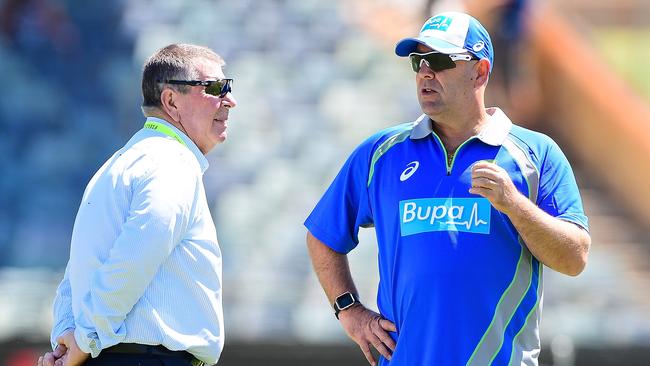
“It’s just the way I was brought up,” Marsh says of his handling of both occasions.
And Marsh, who played 96 Tests, also expresses his firm thoughts about the ball-tampering scandal for the first time.
It all occurred after his time as Australia’s chairman of selectors ended in 2016, but as he celebrates his 50th year involved in first-class cricket the man is more than qualified to speak of the incident involving men he’s still close to.
Marsh writes that “Cricket Australia created this culture”, a “toxic” win-at-all-costs mentality. “It wasn’t around when I was a player [but] it was around when I was a selector,” Marsh says. “At every meeting it was said we had to get to number one in every format.”
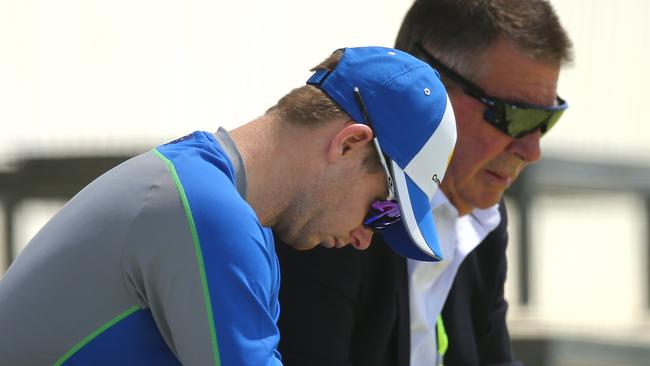
Marsh was surprised by the national fury over ‘Sandpapergate’, after initially think people wouldn’t take much “umbrage” at the “dumb” action of tampering a cricket ball on live television.
“That wasn’t that smart,” Marsh tells me. “No doubt in my mind it was one of the dumbest things I’ve ever seen upon reflection. You can’t get away with that with cameras around …”
But he thinks the 12-month bans dished up to Steve Smith and David Warner, and Cameron Bancroft’s nine-month suspension, were far too harsh for ball-tampering, something that “everyone does” and that has been “happening forever”.
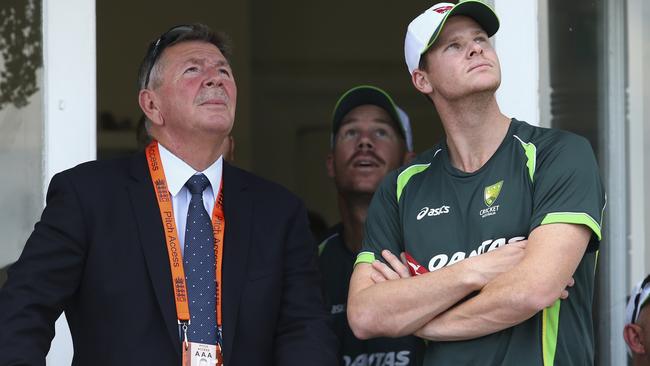
Marsh points out prior to Sandpapergate the biggest ban for ball-tampering before this was a two-match ban from the ICC.
“I wrote it in the book; every fast bowler that has picked up a cricket ball, he’s tampered with it, make no mistake about it,” Marsh said. “I even questioned whether James Sutherland might have picked the seam, a former fast bowler for the University club in Melbourne, who played some matches for Victoria, if he says he hasn’t, I’d ask him the question again …”
He talks about the use of mints, sunscreen and the cricket ball being shined up on the ground. “It was never deemed as cheating yet it’s the same as altering the state of the ball when using sandpaper,” Marsh says.
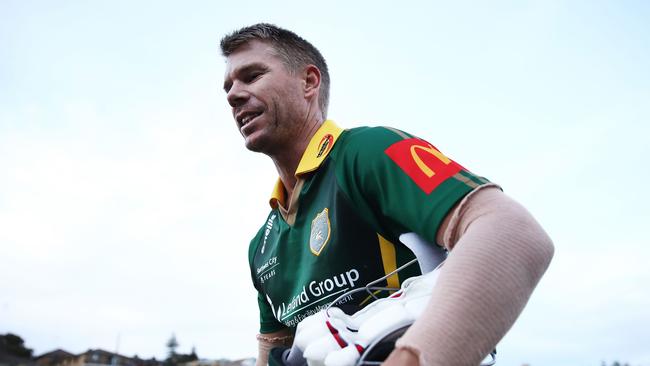
“I felt extremely sorry for Davey Warner. Still the worse thing happened was when Steve Smith and Cam Bancroft going up in front the press at the end of the day’s play. That wasn’t necessary. It caused all the problems.”
He adds: “Look, I will always support the players and there’s a reason for these things happening. They were under an enormous amount of pressure to win. It’s win, win, win, win, win at all costs, which is not the way the game is meant to be played.”
He has “no problem” with Smith and Warner, possibly leading Australia again if they are “deemed the best people” for it. He writes CA were “very aware” of Warner’s “attack dog” role in the team.
“But to my knowledge there was never any pulling him aside and politely inviting him to be quiet on the field, except perhaps when another misdemeanour meant suspension,” he writes in his book.
And so, the players were used like human shields when the issue exploded.
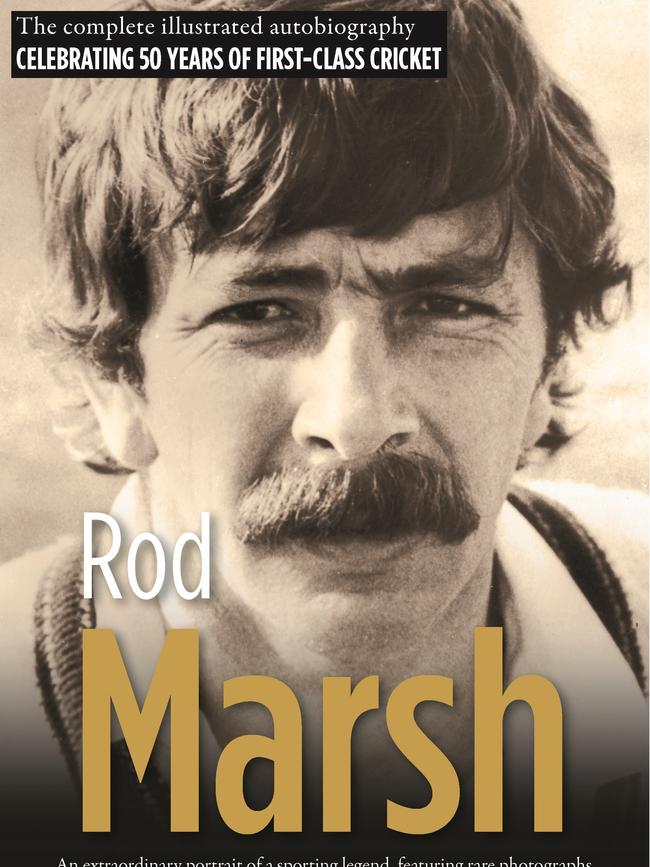
“When it did come to a head, I think Cricket Australia realised they were to blame and the only way they could escape public scrutiny (to a degree, at least) was by imposing these penalties on the three players involved,” Marsh writes.
“They would have been delighted to tell David Warner about his punishment, as they would still have been seething over the role he played in the MOU (pay) saga the year before — another example of how bad things had become.”
I ask Marsh; should sledging be banned?
“Oh no,” Marsh says. “What is sledging? Is sledging abusing someone? If so yes, that should be banned. It should be called abusing someone. The term sledging came from the term subtle as a sledge hammer … it is now abuse. That’s all it is. That’s what should be banned but you should be allowed to say things on the field if they’re clever.
“I don’t know how it’s got nasty. It doesn’t make sense to me.
“There should be no bitterness. If you are going to say something, make it bloody funny. There’s too much encouragement for people to talk it up on the field …”
Controversies aside, Marsh’s book is a detailed look at his life. His early years, how he didn’t fulfil his mother’s dream of becoming a concert pianist, instead jarring his fingers from endless hours of playing Aussie rules and cricket. It documents a brilliant career that featured 355 dismissals, then becoming an academy coach to help usher in a golden era for Australian cricket and later becoming an England coach and selector. He returned to become chairman of selectors for Australia before retiring just before his 70th birthday.
With all his experience Marsh, naturally, has a lot of empathy for players.
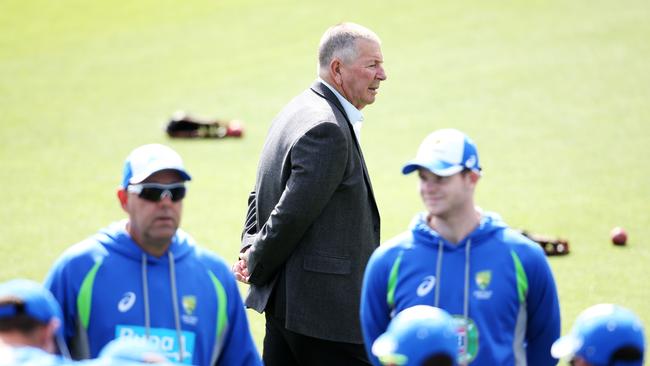
In a year in which the players have been publicly ripped to pieces, Marsh says people should be aware that being a first-class cricketer isn’t a simple existence.
“I know from past experience, and close up experience in the later years what the players have to go through,” Marsh says.
“It’s not an easy thing. It sounds very glamorous. Sure they get paid exceptionally well but it’s a very, very difficult.
“The players have to be looked after and the players have to respect the game … you’ve got to show respect and if you don’t then the game will bite you as we’ve seen.”
Rod Marsh — The illustrated autobiography (Affirm Press) is available 30th October at all good bookstores, Big W, Target and Kmart, $45.
It’s cricket like never before. Every Australia home Test, ODI, T20I Match LIVE and ad-break free. SIGN UP TODAY!


